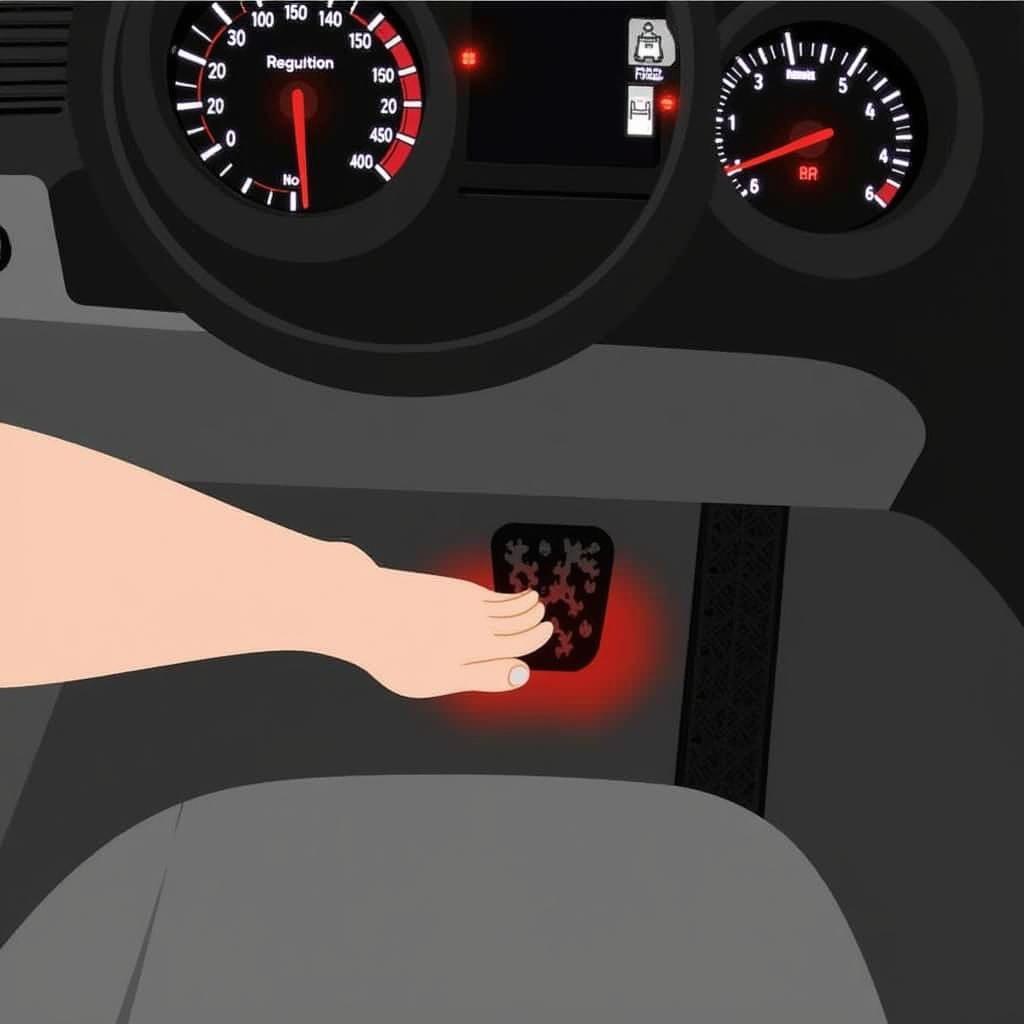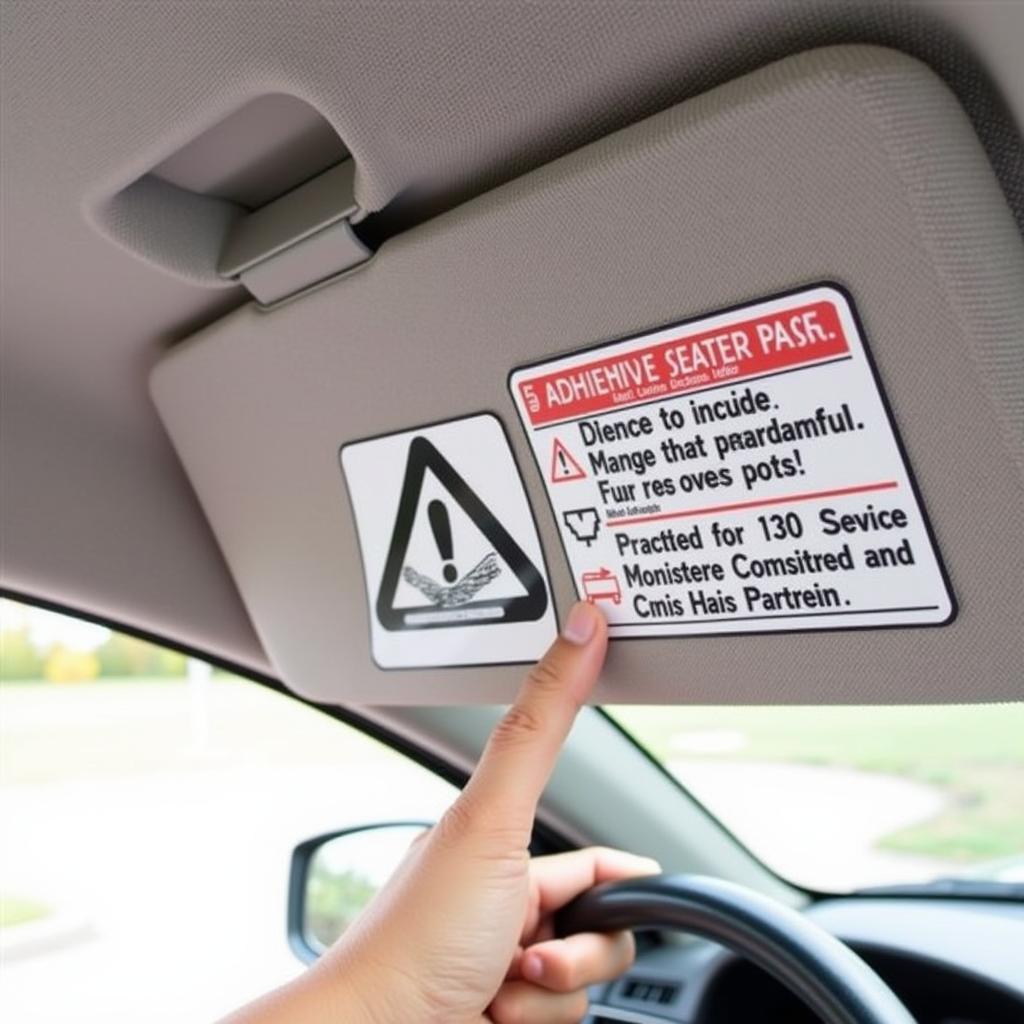A flashing brake warning light in your Volkswagen is a serious indicator that something is wrong with your braking system. It’s crucial to address this issue immediately to prevent potential safety hazards. This article will delve into the common causes behind this warning light, provide practical troubleshooting steps, and offer potential solutions.
Common Causes of a Flashing Brake Warning Light
A flashing brake warning light is often triggered by several factors, ranging from minor issues to serious malfunctions. Here are some of the most frequent culprits:
- Brake Pad Wear: Worn brake pads are a common reason for a flashing brake warning light. The sensors embedded in the brake pads trigger the light when they reach a critical wear threshold.
- Brake Fluid Level: Low brake fluid level can lead to a flashing brake warning light, as it indicates a potential problem with hydraulic pressure within the braking system.
- ABS Sensor Malfunction: The Anti-lock Braking System (ABS) sensors monitor wheel speed and transmit data to the vehicle’s computer. If a sensor malfunctions, it can trigger the warning light.
- Brake System Electrical Issues: Problems with wiring, connectors, or the brake control module can lead to a flashing brake warning light.
- Brake Caliper Problems: A stuck or faulty brake caliper can restrict brake pad movement and result in uneven brake pad wear, leading to a flashing brake warning light.
- Parking Brake Malfunction: A faulty parking brake can sometimes trigger the brake warning light.
Troubleshooting a Flashing Brake Warning Light
Before attempting any repairs, it’s essential to diagnose the root cause of the flashing brake warning light. Here’s a step-by-step guide:
- Check the Brake Fluid Level: Locate the brake fluid reservoir, usually under the hood, and ensure the fluid level is within the designated range. If it’s low, top it off with the correct brake fluid.
- Inspect the Brake Pads: Visually inspect the brake pads to check for excessive wear. If the pads are worn down, they need to be replaced.
- Scan for Diagnostic Trouble Codes (DTCs): Use an OBD2 scanner to read any error codes stored in the vehicle’s computer. These codes can help pinpoint the specific issue within the braking system.
- Check for Electrical Issues: Inspect the wiring and connectors associated with the braking system for any signs of damage or corrosion.
- Test the ABS Sensors: Using a specialized tool, test the ABS sensors for proper operation. If a sensor is faulty, it needs to be replaced.
Solutions for a Flashing Brake Warning Light
The solution for a flashing brake warning light will depend on the underlying cause. Here’s a breakdown of potential solutions:
- Brake Pad Replacement: If worn brake pads are the culprit, they need to be replaced with new ones.
- Brake Fluid Flush and Fill: If the brake fluid is low or contaminated, it’s advisable to perform a brake fluid flush and fill.
- ABS Sensor Replacement: A faulty ABS sensor must be replaced.
- Electrical Repairs: Any damaged wiring or connectors need to be repaired or replaced.
- Brake Caliper Repair or Replacement: A faulty brake caliper might require repair or replacement depending on the extent of the issue.
- Parking Brake Adjustment: A faulty parking brake might need adjustment or repair.
Expert Insights
“A flashing brake warning light shouldn’t be ignored. It’s a clear indication that something is wrong with your vehicle’s braking system,” says John Smith, a certified automotive technician. “By addressing the issue promptly, you can prevent potential accidents and ensure your vehicle remains safe to drive.”
“It’s crucial to use high-quality brake parts for repairs. Using cheap parts can lead to further problems and potentially compromise your vehicle’s safety,” warns Jane Doe, a professional mechanic with over 15 years of experience.
FAQ
Q: Can I drive my car with a flashing brake warning light?
A: It’s generally not recommended to drive with a flashing brake warning light. The issue could be serious and pose a safety risk.
Q: How much does it cost to fix a flashing brake warning light?
A: The cost to fix a flashing brake warning light can vary significantly depending on the cause and the required repairs.
Q: What are the signs of a brake fluid leak?
A: Signs of a brake fluid leak include:
- A soft brake pedal
- A brake warning light
- A low brake fluid level
- Fluid dripping from the brakes
Q: How often should I have my brakes inspected?
A: It’s generally recommended to have your brakes inspected every 6 months or 5,000 miles.
Q: Should I use a generic OBD2 scanner or a VW-specific scanner?
A: A VW-specific scanner can provide more detailed diagnostic information and codes tailored to your vehicle’s model.
Conclusion
A flashing brake warning light in your VW is a serious issue that requires immediate attention. By understanding the potential causes, troubleshooting steps, and available solutions, you can address the problem effectively. Remember, maintaining a safe and reliable braking system is essential for your safety and peace of mind while driving.


